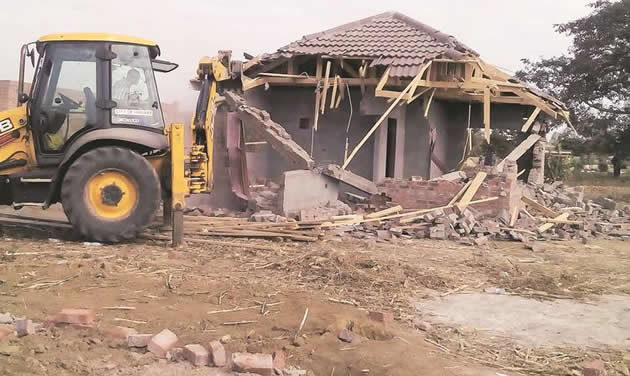10 000 Nyatsime families’ homes face demolition

Over 10 000 families who illegally settled on Chitungwiza’s Nyatsime area, or who built illegal structures after being legally assigned stands, now face eviction and demolition of their houses after the Administrative Court agreed this week that the council was acting correctly in demanding documentary evidence from residents that they were on the land legally.
The court ruling only applies to the Chitungwiza Municipality’s demand for the documentary evidence that each resident was properly allocated the stand they occupy and that the buildings erected were built in accordance with the bylaws.
The Administrative Court made it clear that before anyone could be evicted, or any building demolished, the appropriate court order had to be obtained.
The whole settlement of Braemer and Longlands farms (now collectively known as Nyatsime) is covered in confusion and illegality.
Some were allocated the stands by council and paid for them, but then built houses and other structures without council approval; others just settled on the land without any approval and erected structures without council authority; a third group fell prey to land barons and parted with substantial amounts of money although the land belongs to council.
The area does not have sewer lines, nor is there a water supply. There are no roads and the area is inaccessible during the rainy season.
Four months ago, council issued a notice ordering the residents to produce documents confirming their legal rights and warned of impending demolition of structures illegally built in the area and eviction of illegal settlers.
Trustees of the Nyatsime Beneficiaries Association Trust, appealed the order at the Administrative Court, which ruled this week that council’s decision was above board, paving way for council to institute eviction and demolition proceedings against all illegal occupants.
In the February 2021 notice, council gave the settlers up to a month to produce their offer letters, approved lease agreements, valid service clearance certificates, approved site plans, signed surveyor general’s diagrams, approved and valid building plans, copies of peg forms and copies of stage forms showing all the stages of building were approved.
If anyone was above board and has been following procedures they would have had these documents at hand.
Administrative Court judge Justice Hebert Mandeya ruled that the families did not comply with the urban planning laws but he stressed that the possibility of eviction will only arise when the occupants fail to produce documentation proving they are legally on the land.
He said eviction and demolitions will arise when the occupants fail to produce documents showing their developments were approved by council.
Justice Mandeya also emphasised that council should first obtain eviction orders for the occupants before demolishing or ordering them off the land.
The requirements set out in the Regional, Town and Country Planning Act were valid and reasonable from a town planning point of view, said the judge.
As the local planning authority, the council was duty-bound to ensure that developments made in its area of jurisdiction were done legitimately; hence the insistence on validity and approval.The court noted that the council had promised to obtain all required court orders before ordering any demolitions or any removals.
Matsikidze Attorneys represented Chitungwiza Municipality while Kamdefwere Law Chambers acted for the residents.
In the dismissed appeal, the trustees argued that most of the members were allocated the stands by council but they went on to build after council failed to service the stands.
In all the instances, therefore the enforcement order and or any prohibition order issued or to be issued has no valid or justifiable cause but is only a result of the respondent’s own administrative shortcomings, failure to service the area and is motivated by bias, unreasonableness, entrenched interests and corruption, reads part of the notice of appeal.
They also argued that the order issued by council does not distinguish between those who illegally settled on the land and those who had duly applied for stands and were allocated through leases – THE HERALD




